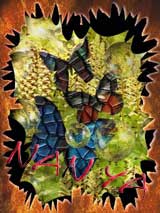

![]()
Preface
During some travel to the Chinese mainland in 1986, I had the very good fortune to be in Gui-lin and to have as my guide, Li Hui-san. The foreign tourism office assigns guides, so serendipity was surely at work here. As it turned out, Li Hui-san was a native of Gui-lin, from a long line of Li’s, a local family with substantial geneology. He was an historian by regional definition, and like myself, gay. As we trodded the sights of Gui-lin we had many fascinating conversations regarding history; and when he finally came out to me, I made inquiries into anything of note in the line of gay Chinese history. My specialty was Sung Dynastic history, which was his forte as well. He spoke of Li K’ai-men, who was a famous Sung poet, a court official and, as it turned out an ancestor of Li Hui-san. Li K’ai-men was also known by his literary name, Nan Ya. K’ai-men was also, by our modern definition, gay. When I asked Li Hui-san for some evidence of this, other than the hearsay of family kitchen chatter, he produced an old box filled with manuscripts. I was amazed. What a find – a 12th Century, Sung Dynasty manuscript. It was in fair condition, and had several younger manuscripts nearby it with annotations. My excitement could not be contained.
Li Hui-san was aware I wanted to translate it – and I immediately set about doing so; however, there was no chance of me being able to complete the task before I left Gui-lin; and there was no chance I could get a manuscript of this age passed Chinese customs. I encouraged Li Hui-san to do some translating himself, and forward me his results. He agreed, but felt his skills at formal or classical Chinese were not quite up to the job. I departed Gui-lin for Pei-jing, with a heavy heart.
I returned Stateside two month later; and to my great joy (and amazement), a parcel was waiting for me. Li Hui-san managed to send me the entire manuscript, intact and without official censure. This was indeed a sacrifice, as the work is an heirloom of his family. I set to work immediately to translate it and discovered some truly incredible things about it. First, it had a title, which is not quite translatable, but can best be rendered as Souvenirs. It was dictated to a scholar named Huang Chin-tsu by an old family servant of the Li clan. It was a biography, or at least a partial biographical accounting of Li K’ai-men, who served the Sung Dynasty from 1125 – 1187. He was the personal tutor and advisor to the Emperor Kao-tsung. He was also a poet of renown; and was exiled for some political folly for quite a number of years. The manuscript is a combination of materials dictated to Huang Chin-tsu by the family servant, K’u Ko-ling and papers written and preserved by K’u (who was basically illiterate). These papers were by both Li K’ai-men and his lifetime male partner, Fu Lin-t’o.
What impressed me most, beside the unique insight into homosexuality in Imperial China, was the fact that Chinese history rarely yields up anything with a local insight, such as a Biography. K’u Ko-ling spent his entire and long life in service to Li K’ai-men, and they became companions of sort. K’u also gained some very sharp insights into the world around him. Between his vernacular, Huang Chin-tsu’s fill-in descriptive from Fu Lin-t’o and Li K’ai-men himself, the resulting translation was quite novel, if not complex. I therefore, decided to adapt the translation to a more readable and accessible style without attempting to rearrange the material to suit Western logic. Occasionally, I will annotate the translation. Annotations will be italicized or contained in footnotes. There are breaks in the material – some missing pages – torn pages and indeed sections, which were never written. With these gaps I will attempt to annotate and create bridges drawn from my own research. I also admit, my own creativity needed to be exercised throughout the work to provide the reader with the most interesting story experience. Although the manuscript has some historic significance, this adaptation is meant for general enjoyment and enrichment rather than academic reference. In fact, the original manuscript has been returned to Li Hui-san. No safe copy could be made without compromising the native media. Rather than destroy so precious an heirloom, I let the gift slip back to Li, where it should rightfully reside. I am nothing more than a silly Westerner enjoying a stroke of good fortune and luck.
Huang Chin-tsu left a small note tucked in the manuscript's box, which reads.
"This personal history incorporates my skill with writing and the family servant's skill in babbling. Many other documents were used to fashion these pages. I was paid well for my effort, receiving a small, but precious pearl pendant, which I gave to my wife; and a handsome emerald ring set in silver, which I mean to pass on to my sons."
I find this note very revealing, as you will also, I am sure. Read on . . .
E(dward) C(liffe) Patterson, MA, January 2, 2003